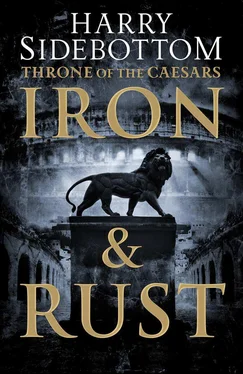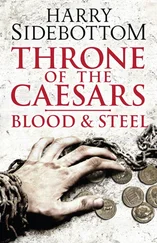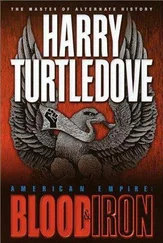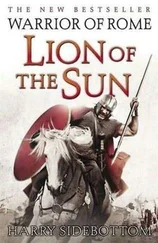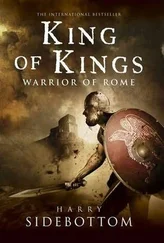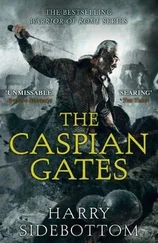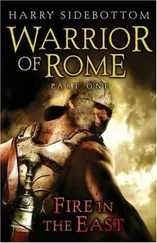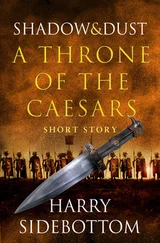Harry Sidebottom - Iron and Rust
Здесь есть возможность читать онлайн «Harry Sidebottom - Iron and Rust» — ознакомительный отрывок электронной книги совершенно бесплатно, а после прочтения отрывка купить полную версию. В некоторых случаях можно слушать аудио, скачать через торрент в формате fb2 и присутствует краткое содержание. Год выпуска: 2014, Издательство: HarperCollins Publishers, Жанр: Исторические приключения, на английском языке. Описание произведения, (предисловие) а так же отзывы посетителей доступны на портале библиотеки ЛибКат.
- Название:Iron and Rust
- Автор:
- Издательство:HarperCollins Publishers
- Жанр:
- Год:2014
- ISBN:нет данных
- Рейтинг книги:4 / 5. Голосов: 1
-
Избранное:Добавить в избранное
- Отзывы:
-
Ваша оценка:
- 80
- 1
- 2
- 3
- 4
- 5
Iron and Rust: краткое содержание, описание и аннотация
Предлагаем к чтению аннотацию, описание, краткое содержание или предисловие (зависит от того, что написал сам автор книги «Iron and Rust»). Если вы не нашли необходимую информацию о книге — напишите в комментариях, мы постараемся отыскать её.
Iron and Rust — читать онлайн ознакомительный отрывок
Ниже представлен текст книги, разбитый по страницам. Система сохранения места последней прочитанной страницы, позволяет с удобством читать онлайн бесплатно книгу «Iron and Rust», без необходимости каждый раз заново искать на чём Вы остановились. Поставьте закладку, и сможете в любой момент перейти на страницу, на которой закончили чтение.
Интервал:
Закладка:
‘Africa, nothing much new out of there.’ Vopiscus was into his flow. He no longer needed the amulet, but was making sweeping oratorical gestures. ‘Gordian and Capelianus will keep a close eye on each other.’ Vopiscus winked, like an actor in a mime.
Timesitheus was already laughing, joining in with everyone else, before his memory supplied the reason for the mirth. Back in the reign of Caracalla — half a lifetime age, long before he entered public life — there had been a scandal. The elder Gordian had been charged with adultery with the wife of Capelianus. Gordian had been guilty, yet he had been acquitted. Gordian’s career had been retarded, and Capelianus had divorced his wife. As she had been declared innocent, Capelianus had been cheated of his hopes of hanging on to her dowry and other property. The men had blamed each other for their misfortunes. Now they had ended up as the governors of the neighbouring provinces of Africa Proconsularis and Numidia, and still they detested each other.
Lechery must run in the blood, Timesitheus thought. All the Gordiani were like sparrows, avid for intercourse, and always with women. The son had been servicing the young wife of old Nummius — what was her name? — until he went to be his father’s legate in Africa. Old Nummius had been complacent. It was said he had liked to watch, then join them. It was also said her demands had brought about his demise. There were worse ways to go. She was blonde, attractive. What was her name?
‘Mauretania Caesariensis is another matter.’ All humour was gone from the manner of Vopiscus. He had his serious, tragic-actor mask on. ‘Orders have been sent for the arrest of the governor. He will be brought here to face charges of treason.’
Simple chronology ruled out sedition. Alexander had been killed eight days before the ides of March. Today was the kalends of April. Twenty-five days, counting inclusively, as almost everyone did. Not enough time for news of Maximinus’ accession to reach Africa, the governor to say or do something seditious, a report to travel to the Rhine and frumentarii to be sent to arrest him. Timesitheus knew little about the fallen governor of Mauretania Caesareniensis, but now he knew the man had an enemy among the inner circle around the new Emperor. But who? And why? It could be one of the Senators Flavius Vopiscus or Honoratus, the new Praetorian Prefect Anullinus, one of the other equestrian assassins Quintus Valerius or Ammonius. And, Timesitheus thought, he should not overlook Catius Clemens; being the brother of his friend did not preclude a murderous vindictiveness. There again, it could be another who had not yet shown his hand. It could be Maximinus himself.
Domitius was speaking. ‘Vitalianus has served the traditional equestrian career with distinction. He commanded an auxiliary cohort in Britain, was a legionary tribune with the 3rd Augustan in Africa, the Prefect of a cavalry unit here on the Rhine, and a Procurator of imperial finances in Cyrenaica. For the last four years he has commanded the Moorish cavalry, leading them through the difficult fighting of the Persian campaign. Twice in Africa, a proven military man, accustomed to the ways of the Moors; there could be no better candidate for the governorship of Mauretania Caesariensis.’
Several hands went up. Maximinus nodded towards Timesitheus.
‘There is no doubt Vitalianus is a fine soldier, and there are always brigands to catch and a few barbarian raiders to chase. But Mauretania Caesariensis is not the scene of a war. The wider protection of the African frontier is in the hands of Capelianus and his 3rd Legion in Numidia. Peaceful provinces, like Mauretania Caesariensis, call for different expertise and experience.’
The eyes of Maximinus were as blank and as watchful as those of a big cat. Timesitheus ploughed on.
‘Gaius Attius Alcimus Felicianus has commanded troops, but most of his life has been devoted to serving the Res Publica in civil capacities. He has been an advocate of the imperial treasury, run the Transpadane poor-relief and been a Procurator in all the four Gallic provinces. For the last two years he has been in charge of the inheritance tax. As you know, he cleaned out an Augean stable of corruption, and again monies flow unimpeded into the military treasury. Without his work, this field army would be an impossibility. Loyal and industrious, the next step for him must be a province.’
As he stopped, Timesitheus felt a coolness emanating from the throne. Certainly, a bureaucrat like Alcimus Felicianus was not obviously going to appeal to an Emperor risen from the barracks.
‘You have never been in either of the provinces of Mauretania?’ Maximinus did not pause for an answer. ‘Before I was Prefect of Egypt, I governed Mauretania Tingitana. The high country runs for hundreds of miles through Caesariensis; good for sheep and bandits, and beyond are the Atlas Mountains and the nomads. Endless tribes of nomads: the Baquates, the Macenites, the Melanogaitouloi, the Quinquegentiani — long, uncouth names; violent, uncouth men. Their chiefs come to the negotiating table at the point of a sword. Peace comes after the stench and horror of massacre.’
Maximinus’ voice had thickened. He stopped talking, his gaze far away, as if on old, unhappy sights. No one spoke. On its low altar, the sacred fire ticked.
A metallic crash. Somewhere beyond the hangings someone had dropped something. Maximinus came back from wherever he had been. He rallied, spoke almost conversationally. ‘So you are wrong, little Greek, there is much marching and fighting and talking to barbarians to be done in the Mauretanias. Legal advocacy, knowledge of the laws concerning wills or poor children; they are less use there than a good seat on a horse and a strong right arm. Let the soldier, Vitalianus, be appointed.’
Timesitheus nodded; it could be taken for nothing but a bow. Fuck! How had he forgotten? Of course Maximinus had campaigned in Mauretania; the stupid, bloodthirsty barbarian would have started a war in the Elysian Fields. Fuck.
Domitius was smirking at him. A space seemed to have opened around him, around the object of imperial rebuke. Even his brainless cousin was giving him a strange look. Probably, Modestus was trying to remember where he had heard the phrase ‘Augean stable’.
Vopiscus had now moved on to the East. The Prefect of Egypt was a creature of the late tyrant’s mother. No one should profit from vice. Another equestrian officer was en route to arrest him, and take control of Egypt.
Timesitheus was so angry, he could scarcely listen. Little Greek . It was bad enough when Romans called a Hellene a Greek , let alone a Graeculus . And here was this hulking, ugly Thracian barbarian calling him little Greek ; calling him Graeculus , in front of the entire imperial counsel. Graeculus — one step up from Boy . And a Thracian saying it! Maximinus probably had ancestral tattoos hidden under that toga. It was a wonder he did not file his teeth into points.
Like any upper-class Hellene, Timesitheus saw all Thracians through the smoke of the sack of Mycalessus in Thucydides. Once read at school, the passage could never be forgotten. It was just after dawn, the citizens of the small Boeotian town innocently stirring, when the Thracians burst in through the open gates. There was confusion on all sides, and death in every shape and form. They cut down everyone; the women and the old alike, the farm animals, every living thing. The children had taken refuge in a school building. The Thracians broke in and killed every one of them.
Domitius was still smirking at him. You little fucker, Timesitheus thought. One day I will lead you out for execution. Not the clean blow of a sword for you. I will have you nailed up on a cross like a slave, or killed the ancient way, stripped and hooded, bound to a barren tree and scourged until your backbone shows through the flesh, or thrown down on the floor of the arena, mauled by the beasts amid your own filth and fear.
Читать дальшеИнтервал:
Закладка:
Похожие книги на «Iron and Rust»
Представляем Вашему вниманию похожие книги на «Iron and Rust» списком для выбора. Мы отобрали схожую по названию и смыслу литературу в надежде предоставить читателям больше вариантов отыскать новые, интересные, ещё непрочитанные произведения.
Обсуждение, отзывы о книге «Iron and Rust» и просто собственные мнения читателей. Оставьте ваши комментарии, напишите, что Вы думаете о произведении, его смысле или главных героях. Укажите что конкретно понравилось, а что нет, и почему Вы так считаете.
